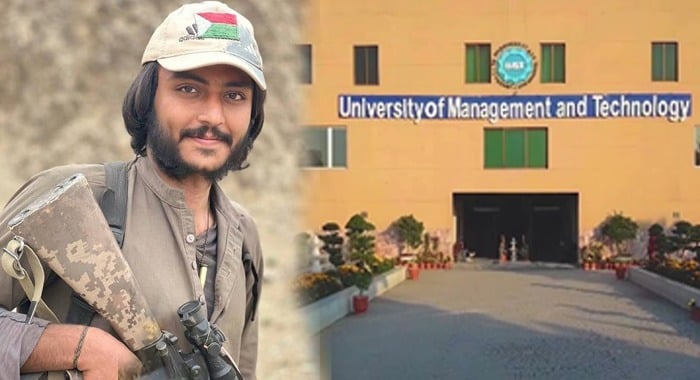In a shocking revelation that underscores the depth of subversion within academic circles, Sufyan Kurd, once a state-sponsored university student and chairman of the Baloch Students Council at the University of Management and Technology (UMT), Lahore, has been confirmed as a senior commander of the India-backed terror outfit Baloch Liberation Army (BLA) and an active member of the proxy war network Fitna al-Hindustan (FAH).
Kurd was killed alongside several militants during Operation Pehrud Cleanser, a high-intensity counter-terror operation conducted between 18 and 22 July in the mountainous belt near Nushki, Balochistan. The joint offensive, carried out by SSG commandos and Frontier Corps North and South, was launched in response to a recent terror attack on a passenger bus in Kalat.
Security forces were airlifted into remote terrorist hideouts via heliborne insertions, backed by Army Aviation gunship support, and carried out precise ground engagements. The result: a crushing blow to BLA infrastructure, seizure of a massive arms cache, and destruction of key narcotics stockpiles, including ICE, opium, and Pheniramine Maleate injections, substances the BLA has used to sedate its suicide attackers in recent years.
Among those neutralized was Sufyan Kurd, long portrayed as a student leader advocating Baloch rights. In reality, he was a trained militant commander, deeply embedded within the BLA’s military media task force, and one of the brains behind the outfit’s digital propaganda campaign, underwritten by Indian intelligence handlers operating the FAH proxy structure.
Despite receiving full academic funding from the state, Kurd betrayed his country, using his university platform to radicalise vulnerable Baloch youth and recruit them into the BLA’s terror ranks. Social media posts released by BLA affiliates confirmed his death and glorified him as a “shaheed of the liberation struggle,” laying bare the true nature of his activities and exposing how Indian proxies are weaponizing Pakistan’s academic space.
Kurd’s elimination has also pulled the mask off the Baloch Yakjehti Committee (BYC), a group that claims to represent Baloch civil rights but has now gone eerily silent. In the past, BYC rushed to protest any state action against BLA operatives. Its current silence following Kurd’s death suggests ideological complicity or silent alignment with anti-state militancy disguised as activism.
Analysts believe Operation Pehrud Cleanser marks a turning point, not just in flushing out militants from remote terrain but also in confronting the urban recruitment and propaganda hubs that fuel insurgency. The BLA’s exposure as a drug-funded, foreign-sponsored mercenary outfit, and the seizure of advanced American rifles and Chinese anti-armour weaponry, further proves the transnational backing behind the so-called separatist movement.
Kurd’s trajectory—from scholarship student to Indian proxy foot soldier, is a chilling reminder of the need for enhanced oversight in universities. Authorities are urging the Higher Education Commission (HEC) and campus administrations to monitor student group funding, vet guest speakers, and supervise digital media operations to prevent educational platforms from being turned into terror incubators.
But beyond security reforms, there is also a call to embrace and invest in sincere Baloch students and activists, so that grievances are addressed through opportunity, not exploited through extremism. Because Sufyan Kurd’s story isn’t just one of betrayal, it’s a warning: when the state funds your future, turning against it in the name of a foreign-fueled fantasy is not revolution, it’s treason.





